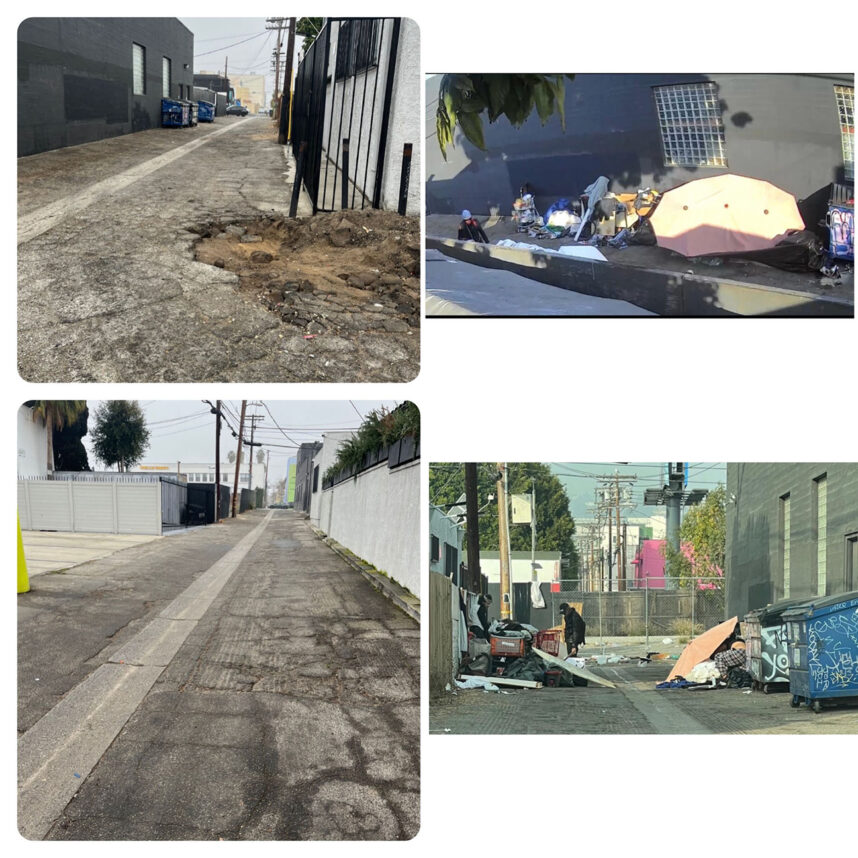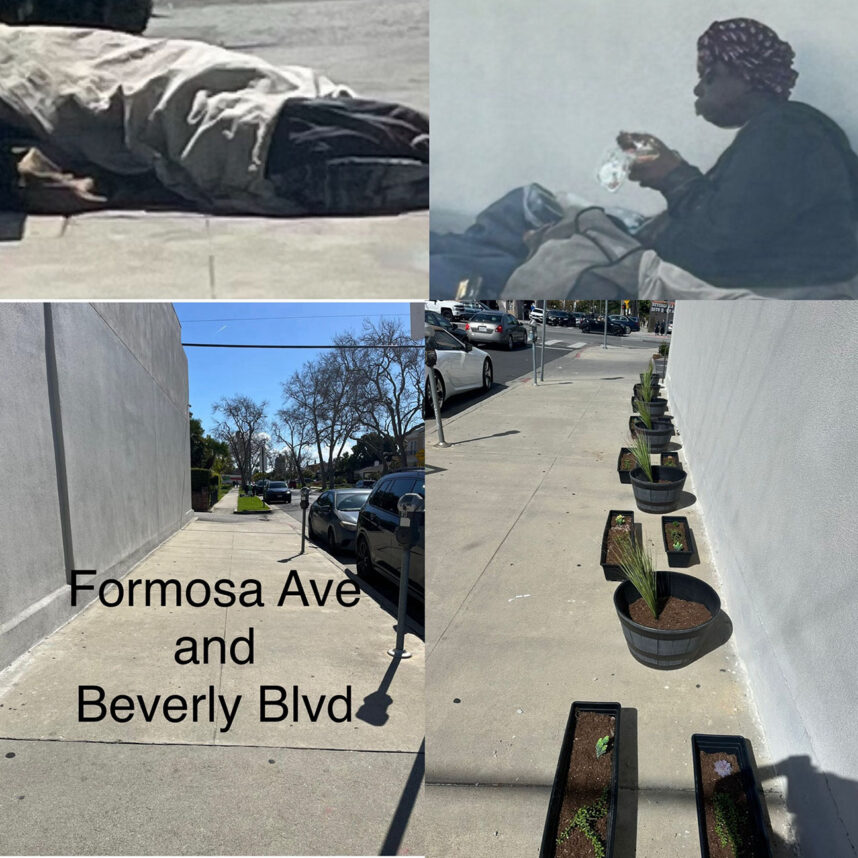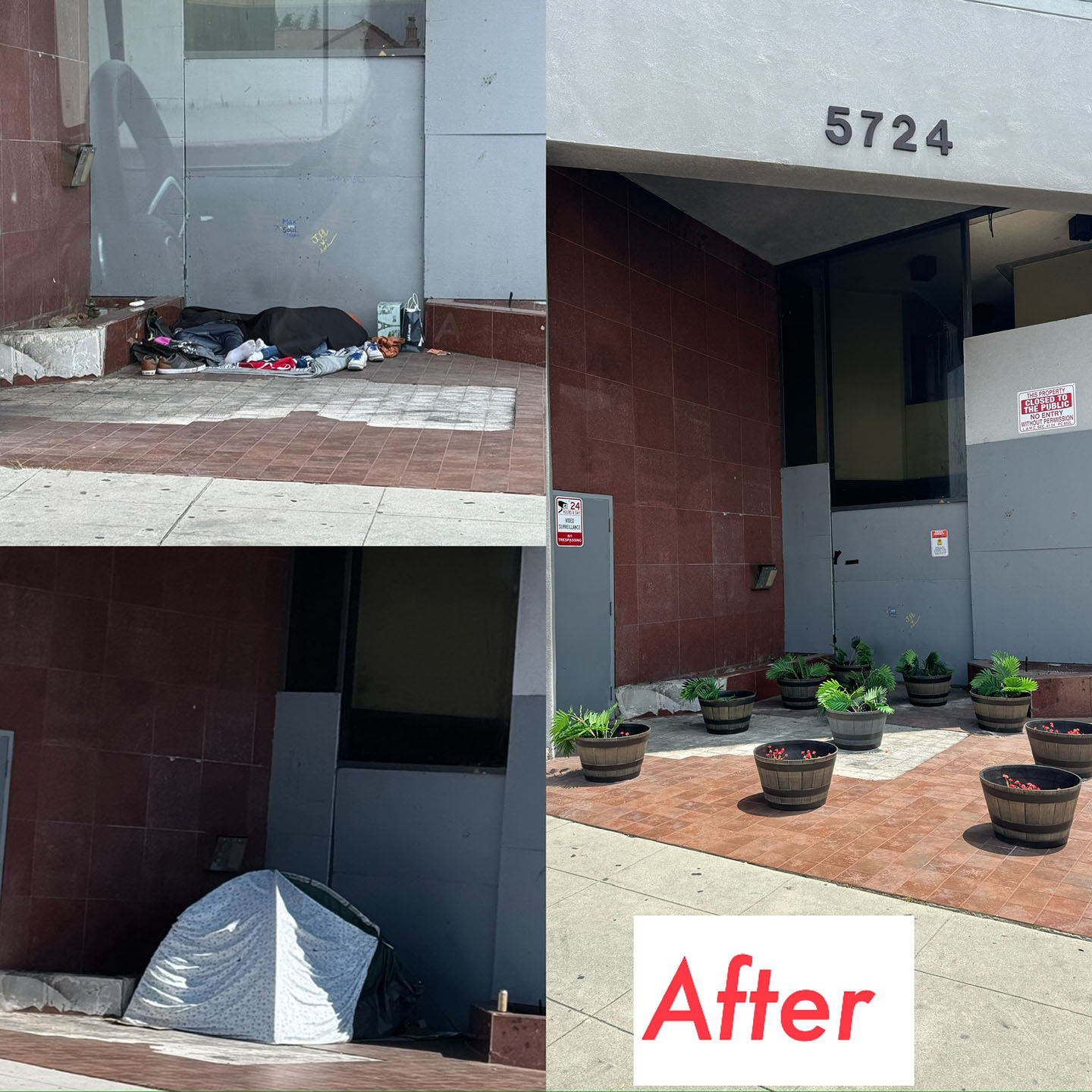April Silverman, a resident of Hancock Park, grew increasingly frustrated by the city’s inaction against a homeless man who was terrorizing her quiet neighborhood. Despite constant complaints from residents, no action was taken.
“I followed all the steps the city of Los Angeles outlines,” said Silverman. “I called 311—no response. I emailed L.A. Councilwoman Katy Yaroslavsky’s team, but no action was taken.”
At first, the man was camped near Ralph’s, a block and a half away from her house. But when he started moving closer to the residential area and more and more tents started popping up, Silverman said, “That’s enough!”
After six weeks of unsuccessfully trying to get the city to act, the determined Silverman decided to take matters into her own hands, to the immense relief of her neighbors.
“The kids were petrified and no one could walk to the temple like this. It had been a problem for months,” she said.
When a CARE+ cleanup was scheduled, Silverman hired a security guard, arrived at 5 a.m. and started removing the belongings left by the homeless man. She also arranged for a massive concrete wall to be built. “By the time the cleanup was over, he had nowhere to sit, and he didn’t come back.”
CARE+ is a program where city officials conduct mandatory cleanups of homeless encampments. Silverman compares it to hotel room service: they clean, throw away trash, and make the area tidy, only for the homeless to return, set up their tents and let it get dirty again.
“[Mayor] Karen Bass’s philosophy isn’t working,” said Silverman. “She has the ‘Housing First’ philosophy, which doesn’t take anything else into account—not mental health, not drug use or anything like that. If you have somebody who does drugs, they feel invincible. Only 6% of them accept Bass’s permanent housing. They don’t want housing; they want to continue dealing drugs. They’d rather be out on the streets than deal with the regulations of being housed. We are in a real crisis here.”
“We are in a real crisis here.”- April Silverman
The issue started in October 2023, when tents began appearing in the upscale neighborhood along Sycamore Avenue. There were not only tents and cars, but also non-stop activity involving drug sales. According to Silverman, people used the area like a drive-thru, purchasing drugs through car windows. These individuals even commandeered city cones to block parking on the street, giving themselves full control of the block. As the number of tents, cars and drug users increased, so did the piles of trash, and nobody felt safe anymore.

It wasn’t only residents who suffered but also local businesses dealing with homeless encampments right outside their doors. With no laws preventing tents from being set up anywhere, business owners were left to fend for themselves. Some found creative ways to address the issue, installing bike racks and large planters to deter transients.
“If you drive on Third Street and Beverly, you’ll see bike racks everywhere, and it’s not for bikers,” said Silverman. “Store owners were tired of the city council and the mayor not doing anything. They couldn’t get rid of the homeless person squatting next to their business. People couldn’t get into their stores, and they lost business as a result.”
Silverman applied the same strategy across Jewish neighborhoods in Los Angeles. She started in Hancock Park and recently did the same in the Pico area. She shows up as soon as a cleanup is underway and arranges for deterrents, often in the form of large, decorative planters that prevent transients from camping outside stores again. “If you don’t make deterrents, they’re going to keep coming back and start all over again,” she said.
Since starting her cleanup project, Silverman’s name has become well-known in Jewish communities and among business owners seeking her help. Building deterrents costs money for materials and labor, but the community, having suffered for years, is willing to pay.
Silverman doesn’t profit from her endeavor. In fact, she said, she uses her own money, time and energy for these projects.
“They know I understand the law and policies, and I’m coaching them because you have to say the right thing, or no one will help you. The police are so understaffed and were defunded in 2020, the culture has become so anti-police and they’re scared to act.”
Silverman has become a full-time community and political activist. Before the presidential elections, she prepared a voter’s guide to help people choose candidates who were pro- police, law and order, parental rights and Israel. “I got 10,000 people to vote using my guide,” she said. “I picked up ballots, explained the candidates’ platforms and got people involved in Valley Village, Agoura, Pico, Beverlywood and other Jewish neighborhoods.”
Over a year has passed since Silverman cleaned up Hancock Park, proving it’s possible to resolve the problem. None of the homeless people have returned, having moved to other neighborhoods lacking an activist like Silverman.

Despite massive funds being spent on the homeless crisis, the problem persists, raising questions about where the money goes and why the city doesn’t change its policies.
“The city’s policy is the tolerance approach,” said Silverman. “But giving drug addicts clean needles and Naloxone to revive them isn’t tolerance—for them or for taxpayers and the innocent people walking by. It’s unacceptable. Somebody has to put a stop to this because it’s not working.”
If you would like to support the cause of cleaning up the Jewish neighborhoods of LA, consider donating to April Silverman.
Venmo: @AprilSilverman or Zelle: [email protected]




